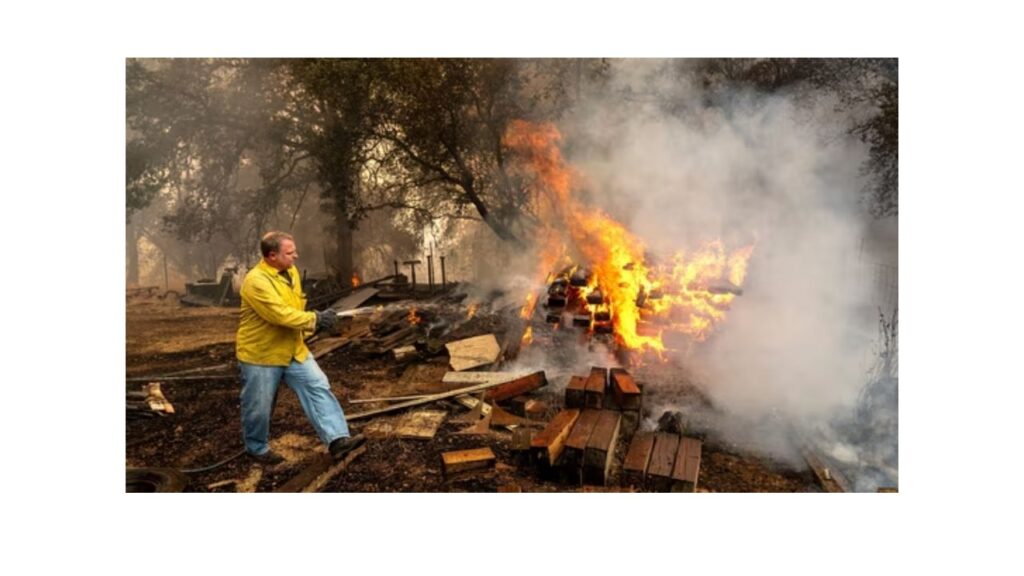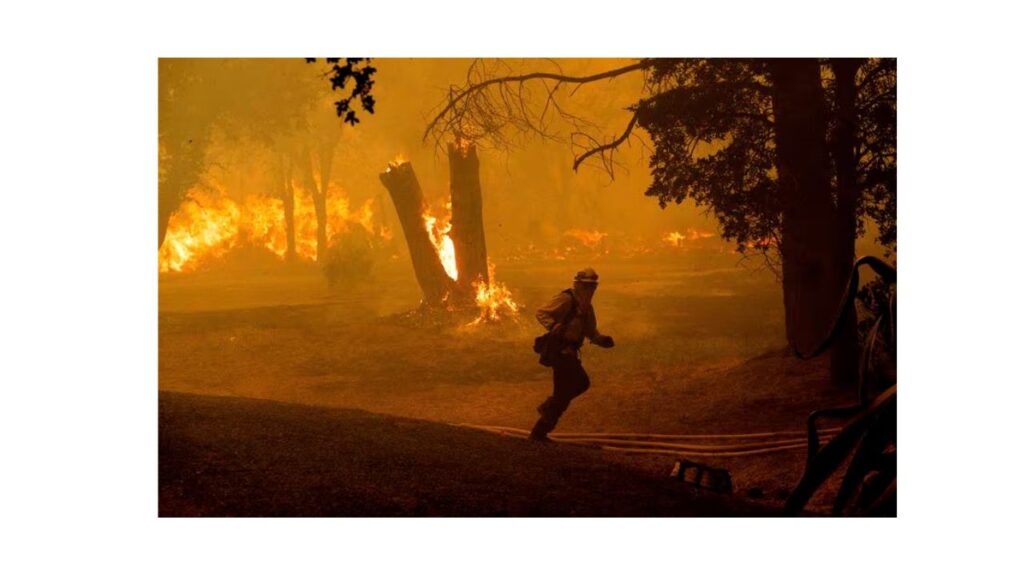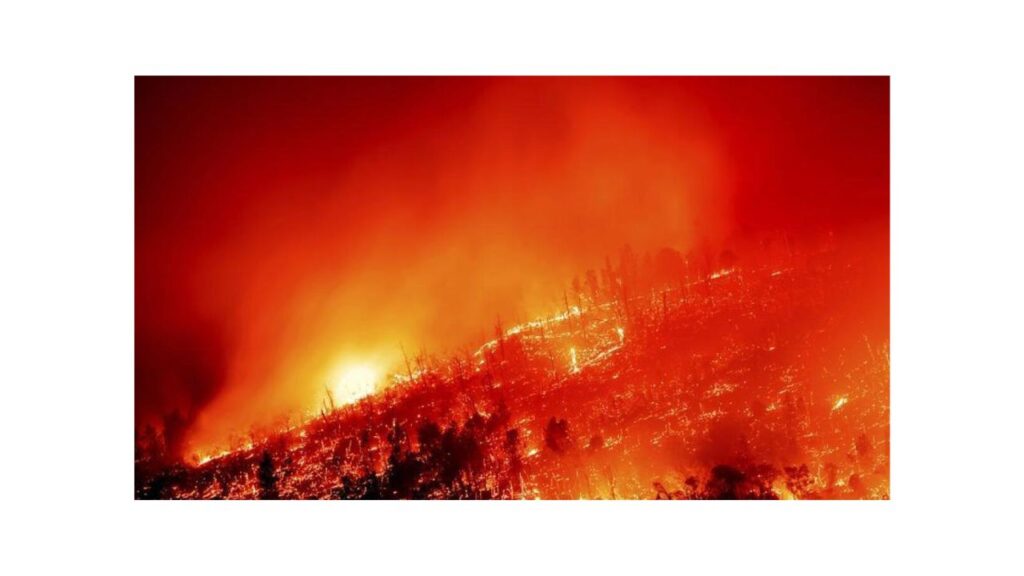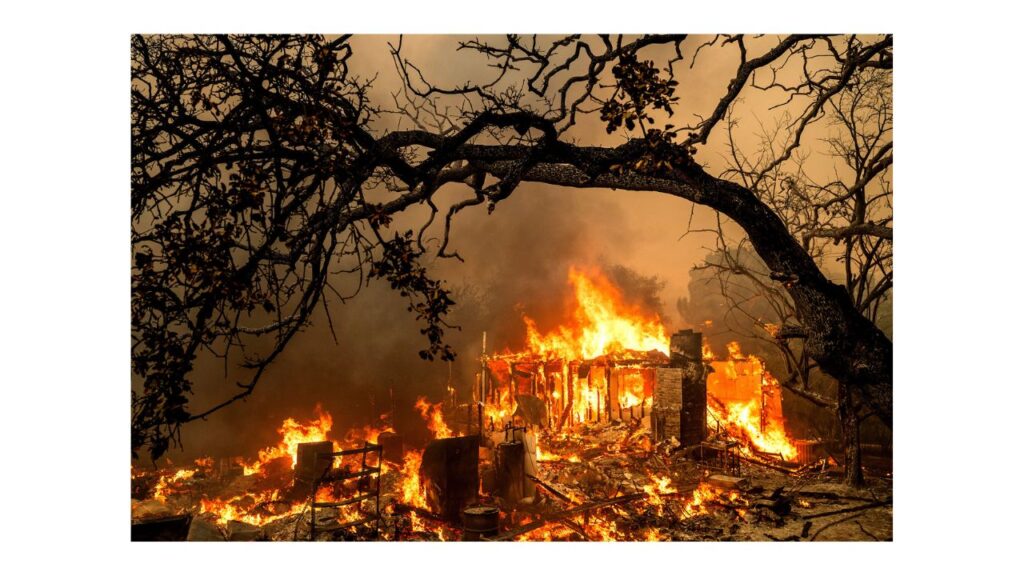Residents in Oroville, which is close to the town of Paradise, which was destroyed by a wildfire in 2018, are in danger as a result of the fire, which has burned over 3,000 acres.
David Pittman remained calm as a rapidly spreading wildfire spread across thousands of acres in Butte County on Tuesday. He loaded up his family and headed to his sister’s home in Oroville, California, across town, taking along their 90-pound African sulcata tortoise.
He intends to remain there for the next few days, at least until firefighters contain the Thompson fire, which has destroyed a number of homes and cars and forced around 26,000 people—among them Mr. Pittman—to flee.
He remarked on Wednesday, “I hate to say it, but we’re experienced in this kind of stuff.”
Oroville, a small town in Northern California with Gold Rush heritage located 65 miles north of Sacramento close to the state’s second-largest reservoir, is led by its mayor, Mr. Pittman, 70. In addition, he was a retired local fire chief who had witnessed numerous tragedies strike his area in the last few years.

When roaring rapids from an emergency spillway at the neighboring Oroville Dam threatened to flood the town in 2017, authorities issued an order for inhabitants to leave Oroville. The community of Paradise, which is located approximately 20 miles north of Oroville, was almost completely destroyed by the Camp fire, one of the deadliest wildfires in American history, which claimed 85 lives the following year in 2018.
Millions of acres were burned during a record-breaking fire season in 2020 in California, including “right into the city of Oroville,” according to Mr. Pittman. The Dixie fire in 2021, which was larger than the combined areas of New York, Los Angeles, Chicago, and Dallas, was the second largest fire in California history. It was started by damaged PG&E power lines close to the Feather River, the waterway that splits Oroville in half.

Experts have stated that the different calamities are signs of growing climate extremes, which have caused the West to experience catastrophic floods and fierce wildfires almost nonstop. Climate experts issued a warning this year, stating that a dry summer in the West might cause plants that grew in abundance over a wet winter to become perfect tinder for a hazardous fire season.
Many Oroville residents who were at evacuation shelters on Wednesday had become accustomed to escaping flames.
Vernon Englund, 78, said he had evacuated from a fire three times in the previous four years while sitting in the 106 degree heat outside a church shelter a few miles from the fire.
“We’ve had enough evacuations that we have to-go bags, so I just hooked up my RV and headed out,” he remarked. The fire came closer than he had anticipated, so I think I should have been more concerned than I was, he said.
This was 22-year-old Ashlie Boocks’ second evacuation in three years. She had gone to the church shelter on Tuesday after spotting “ash the size of my palm” floating from the sky.
She claimed that Tuesday night, she took a car to a location from where she could see flames illuminating the entire mountaintop. She described it as “just horrible, lit up.” “You’re witnessing explosions in propane tanks. They are audible to you.

She went on, “This is not something that ought to be typical.”
The largest power company in California, Pacific Gas & Electric, turned off the electricity to over 2,000 homes and businesses in eight counties on Tuesday, The Sacramento Bee reported. This week, the company turned off the electricity in Butte County and other regions of Northern California due to an elevated fire danger.
The Thompson fire, which erupted on Tuesday morning, remains small compared with the major fires in past years; as of Wednesday night, it had burned nearly 3,600 acres of mountainous terrain near Lake Oroville and was 7 percent contained, according to Cal Fire, the state’s firefighting agency. So far, eight injuries have been reported as a result of the blaze. And the authorities have not yet said how many structures have been damaged, though the fire has consumed homes and vehicles, based on news coverage.
The California Department of Water Resources stated on Tuesday night that while the evacuation orders had an impact on several state water facilities, Oroville Dam—the highest dam in the country—was not in danger.
Mr. Pittman said that controlling the fire would be especially challenging because of the intense heat that is sweltering the state this week and the erratic winds. The National Weather Service predicted that Oroville would see temperatures as high as 110 degrees on Wednesday and much higher by the end of the week.
“The fire is being moved around by the up-and-down breezes,” he stated. “Fuels are prepared for burning. Thus, the workers’ work is difficult.
“I’m standing outside and I can feel the heat through my T-shirt,” he continued.
He added that all evacuation facilities were packed. To allow emergency personnel to concentrate on fighting the fire, a sizable fireworks show that usually brings in over 10,000 spectators to Oroville was canceled.
On Wednesday, Oroville officials temporarily outlawed the usage of pyrotechnics of any type within the city, but they did not outlaw lawful sales, which have long been a summertime source of funding for nearby charity organizations. Except in the cities of Oroville, Gridley, and Biggs, where those with a “safe and sane” seal may be used, fireworks are prohibited throughout Butte County.
At a press conference late on Tuesday, Butte County Sheriff Kory Honea stated, “The last thing we need is somebody who bought fireworks from a local fire stand going out and doing something stupid.” “Don’t be a moron, start a fire, and give us more problems.”
In any case, the fireworks might not be as visually stunning as usual: At one time, according to the mayor, the smoke in Oroville’s downtown was so dense that he was unable to see his hand in front of his face. While many businesses were closed, several evacuees with trailers or recreational vehicles had gathered there.

Workers were coping with their own instructions to evacuate, thus according to Brian Wong, Union Patio Bar and Grill would stay open with fewer employees. He stated there will be a discount for evacuees.
He answered, “We’ll just do what we can.” “We are here to serve the community today.”
However, Mr. Wong, 53, stated he would not be present. Rather, he intends to remain at his house with his father-in-law, where they intend to put out any nearby fires in an effort to safeguard the property.
Mr. Wong stated that he was hesitant to leave even though his house is under an evacuation order and the majority of his neighbors had already left. He cited his experiences witnessing the difficulties faced by the people of Paradise and other communities in getting insurance payouts or other emergency relief.
He stated, “Many of those cases are still unresolved.” “A large number of property owners will not receive their due compensation. I therefore really didn’t want to go.
He continued by saying that while some of his neighbors had simply gone without insurance due to firms discontinuing coverage in numerous parts of California, many of them had been forced to pay exorbitant insurance prices.
Mr. Wong, who has spent more than 25 years living full-time in Oroville, claimed that he and his family had followed fire experts’ advice to clear brush from the property. In addition, he had declared himself prepared to depart if needed and had loaded his truck with valuables.
Even yet, as of Wednesday afternoon, he was watching the plumes of smoke and bracing himself in the hopes that his neighborhood might escape unharmed.
